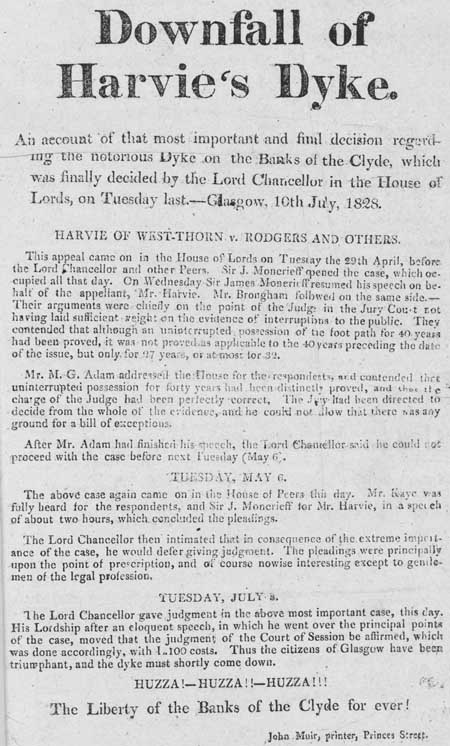Transcription
Downfall of
Harvie's Dyke. An account of that most important and find decision regard-
ing the notorious Dyke on the Banks of the Clyde, which
was finally decided by the Lord Chancellor in the House of
Lords, on Tuesday last.-Glasgow, 10th July, 1828. HARVIE Of WEST-THORN v. RODGERS AND OTHERS. This appeal came on in the House of Lords on Tuesday the 29th April, before
the Lord Chancellor and other Peers. Sir J. Moncrieff opened the case, which oc-
cupied all that day. On Wednesday Sir James Moncrieff resumed his speech on be-
half of the appellant, Mr.Harvie. Mr. Brongham followed on the same side.
Their arguments were chiefly on the point of the Judge in the Jury Court not
having laid sufficient weight on the evidence of interruptions to the public. They
contended that although an uninterrupted possession of he foot path for 40 years
had been proved, it was not proved as applicable to the 40 years preceding the date
of the issue, but only for 27 years, or at most for 32. Mr. M . G. Adam addressed the House for the respondents, and contended that
uninterrupted possession for forty years had been distinctly proved,and that the
charge of the Judge had been perfectly correct, The Jury had been directed to
decide from the whole of the evidence , and he could not allow that there was any
ground for a bill of exceptions. After Mr. Adam had finished his speech, the Lord Chancellor said he could not
proceed with the case before next Tuesday (May 6). TUESDAY, MAY 6. The above case again came on in the House of Peers this day. Mr. Kaye was
fully heard for the respondents, and Sir J. Moncrieff for Mr. Harvie, in a speech
of about two hours, which concluded the pleadings. The Lord Chancellor then intimated that in consequence of the extreme import-
ance of the case, he would defer giving judgment. The pleadings were principally
upon the point of prescription, and of course nowise interesting except to gentle-
men of the legal profession. TUESDAY, JULY 8. The Lord Chancellor gave judgment in the above most important case, this day.
His Lordship after an eloquent speech, in which he went over the principal points
of the case, moved that the judgment of the Court of Session be affirmed, which
was done accordingly, with I ,.100 costs. Thus the citizens of Glasgow have been
triumphant, and the dyke must shortly come down. HUZZA!-HUZZA!!-HUZZA!!! The Liberty of the Banks of the Clyde for ever ! John Muir, printer, Princes Street.
View Commentary | Download PDF Facsimile
|


